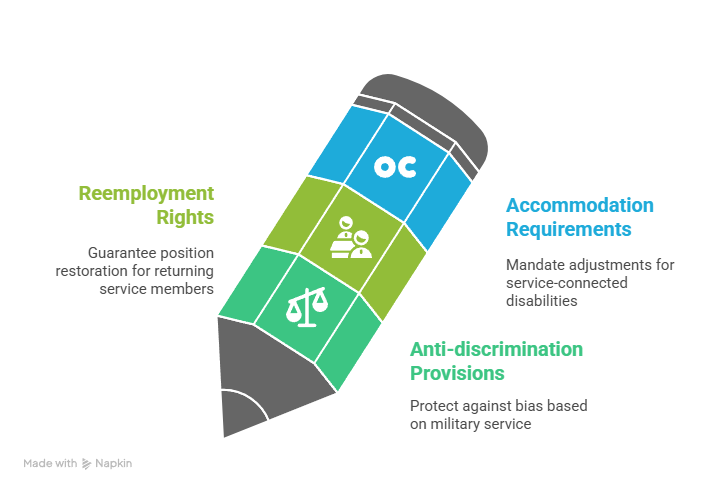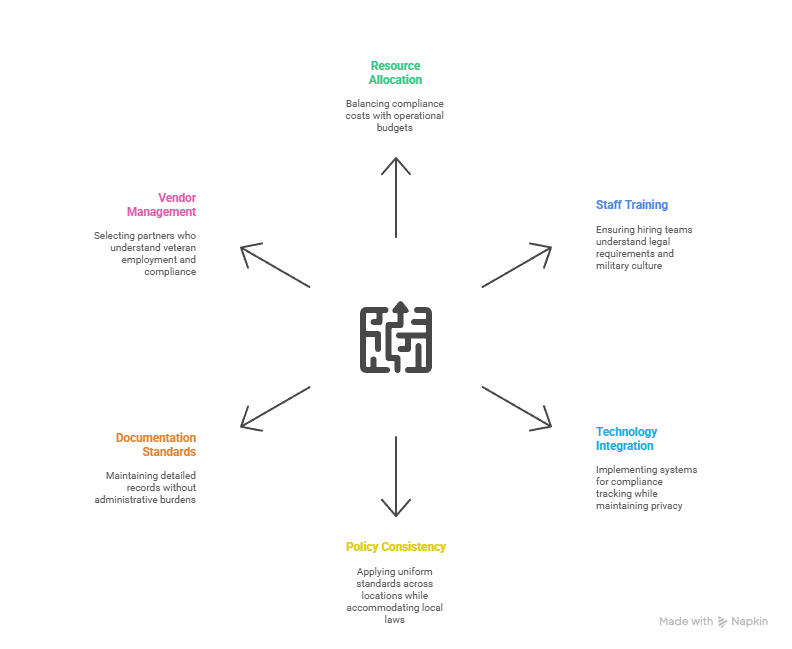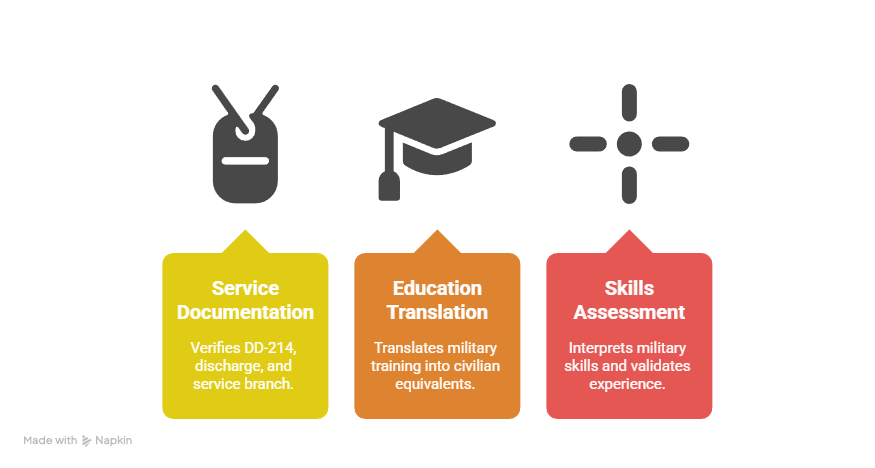Veteran hiring compliance requires employers to navigate complex federal laws like VEVRAA, USERRA, and OFCCP regulations while maintaining fair and consistent screening practices. Strategic background check processes help employers meet recordkeeping requirements, avoid discrimination claims, and build truly veteran-friendly workplaces that go beyond compliance checkboxes.
Key Takeaways
- VEVRAA compliance mandates federal contractors actively recruit veterans and maintain detailed hiring records, making proper employment screening documentation essential for OFCCP audits.
- USERRA protections require employers to verify military service accurately while avoiding discrimination, which background checks can support through proper employment verification processes.
- Employment screening for veterans must balance compliance requirements with fair hiring practices, considering factors like security clearances, military education credits, and discharge status verification.
- FCRA compliance becomes critical when screening veteran candidates, requiring proper consent procedures, adverse action protocols, and documentation standards for all background check activities.
- Drug testing policies for veteran hires must consider federal requirements versus state cannabis laws, plus reasonable accommodations for prescription medications related to service-connected disabilities.
- Consistent screening processes help employers avoid discrimination claims while building veteran-friendly employer brands that attract top military talent and improve retention rates.
Why Veteran Hiring Compliance Matters for Modern Employers
Veteran hiring compliance has evolved from a nice-to-have initiative into a business-critical requirement for many employers across industries and sectors. Federal contractors face mandatory obligations under multiple overlapping laws, while non-federal employers increasingly recognize that veteran-friendly hiring practices drive competitive advantages in talent acquisition and workforce development. However, compliance complexity continues growing as federal regulations intersect with state-specific employment laws, creating potential liability risks for unprepared organizations who underestimate these requirements.
The stakes extend far beyond simply avoiding penalties and regulatory scrutiny. Companies that master veteran hiring compliance often discover improved hiring processes, stronger employer brands, and access to skilled talent pools that competitors miss entirely. Background checks and employment screening play pivotal roles in this success, providing the documentation, verification, and consistency that compliance officers need while supporting fair hiring practices that veterans deserve.
Strategic veteran hiring compliance creates opportunities for organizations to build more inclusive, diverse workforces while accessing unique skills and leadership experience that military service develops. Veterans bring proven abilities in teamwork, problem-solving, adaptability, and performance under pressure that translate directly to civilian workplace success. However, realizing these benefits requires understanding how compliance requirements interact with screening processes and candidate experiences throughout the hiring pipeline.
Key Federal Laws Governing Veteran Employment
Understanding veteran hiring compliance starts with mastering three core legal frameworks that shape employer obligations across different organizational contexts and industry sectors. These laws work together to create comprehensive protections for military service members and veterans while establishing specific requirements for different types of employers based on federal contracting status, workforce size, and operational scope. The intersection of these regulations with standard employment practices creates both opportunities and challenges that smart screening processes can help address effectively.
| Law | Primary Focus | Employer Coverage |
| VEVRAA | Affirmative action and outreach requirements | Federal contractors and subcontractors |
| USERRA | Employment protections and reemployment rights | All employers regardless of size or sector |
| ADA | Disability accommodations and medical considerations | Employers with 15+ employees in most cases |
These overlapping obligations require employers to navigate multiple compliance frameworks simultaneously while maintaining consistent hiring practices. Background check processes must accommodate all applicable requirements while supporting fair evaluation of veteran candidates throughout the screening pipeline.
VEVRAA Affirmative Action Requirements
The Vietnam Era Veterans' Readjustment Assistance Act requires federal contractors and subcontractors to take affirmative action in hiring protected veterans across all job categories and organizational levels. Covered contractors must maintain detailed records of veteran applicants, outreach efforts, hiring outcomes, and accommodation processes for potential OFCCP compliance reviews and audit investigations. These extensive recordkeeping obligations make proper candidate identification and documentation essential components of any compliant hiring process, requiring sophisticated data management systems and consistent application procedures.
VEVRAA's reporting requirements extend beyond simple headcounts and basic demographic tracking. Contractors must demonstrate good faith efforts in veteran recruitment through measurable outreach activities, track hiring ratios by job category and organizational level, and document accommodation processes for service-connected disabilities. Background check providers who understand VEVRAA requirements can help employers capture necessary data points during screening while maintaining candidate privacy and FCRA compliance standards throughout the investigation process.
USERRA Reemployment Rights and Protections
The Uniformed Services Employment and Reemployment Rights Act provides comprehensive employment protections for service members and veterans across all sectors of the economy, regardless of federal contracting status or organizational size. USERRA prohibits discrimination based on military service while requiring employers to provide reasonable accommodations for service-connected disabilities and reemployment rights for returning service members. These broad protections influence how employers can structure background check processes and evaluate military-related information during hiring decisions.

- Anti-discrimination provisions: Protect against bias based on military service, deployment history, or reserve obligations
- Reemployment rights: Guarantee position restoration for returning service members with proper notice
- Accommodation requirements: Mandate reasonable adjustments for service-connected disabilities during screening and employment
USERRA's comprehensive scope makes it applicable to virtually all employment situations involving veterans or active service members. Employers must ensure that background check policies and procedures align with these protections while maintaining legitimate business requirements and safety standards.
ADA Intersections with Veteran Hiring
Americans with Disabilities Act requirements frequently intersect with veteran hiring compliance, particularly regarding service-connected disabilities, prescription medication use, and accommodation needs in screening processes. Employers must navigate reasonable accommodation obligations while maintaining safety-sensitive position requirements and federal drug testing mandates where applicable. This complex balance requires careful screening process design that considers both disability rights and legitimate business needs while avoiding discrimination against qualified veteran candidates.
Medical examinations and drug testing policies need particular attention when screening veteran candidates who may have service-connected disabilities or medical conditions. Service-connected disabilities may require accommodation in testing procedures, scheduling, or evaluation criteria, while prescription medications for conditions like PTSD, traumatic brain injury, or chronic pain create complex evaluation scenarios that require individualized assessment.
Common Compliance Challenges Employers Face
Veteran hiring compliance creates unique operational challenges that many employers underestimate until facing OFCCP audits, discrimination claims, or regulatory investigations that expose process weaknesses and documentation gaps. Recordkeeping requirements demand sophisticated data management systems that can track veteran status, accommodation requests, hiring outcomes, and compliance metrics across multiple positions, time periods, and organizational locations. Meanwhile, multi-state employers must navigate varying state laws that can conflict with federal requirements, creating additional complexity in policy development and implementation.

- Resource Allocation: Balancing compliance costs with operational budgets and competing business priorities
- Staff Training: Ensuring hiring teams understand complex legal requirements and military culture competency
- Technology Integration: Implementing systems that support compliance tracking while maintaining candidate privacy
- Policy Consistency: Applying uniform standards across multiple locations while accommodating local law variations
- Documentation Standards: Maintaining detailed records that satisfy audit requirements without creating administrative burdens
- Vendor Management: Selecting screening partners who understand veteran employment contexts and compliance requirements
The challenge intensifies significantly for employers who want to go beyond minimum compliance requirements to build genuinely veteran-friendly hiring programs. This approach requires understanding nuanced issues like military occupation code translations, security clearance implications, and cultural competency in interviewing practices that influence background check processes and candidate experiences.
Navigating OFCCP Audit Requirements
OFCCP compliance audits can request extensive documentation about veteran hiring practices, outreach efforts, screening procedures, and accommodation processes that span multiple years of hiring activity. Auditors examine whether employers can demonstrate good faith efforts in veteran recruitment, evaluate whether hiring practices create potential barriers for veteran candidates, and assess the adequacy of accommodation procedures for service-connected disabilities. Background check documentation becomes crucial evidence in these comprehensive reviews, requiring careful attention to record retention policies and data organization systems.
| Audit Focus Area | Required Documentation |
| Outreach Efforts | Partnership agreements, advertising records, recruitment event participation |
| Hiring Outcomes | Applicant flow data, selection ratios, accommodation tracking records |
| Screening Procedures | Background check criteria, adverse action documentation, consistency measures |
Successful audit preparation requires proactive documentation strategies and partnership with screening providers who understand compliance requirements. Organizations that establish proper record-keeping systems from program inception typically experience smoother audit processes and demonstrate genuine commitment to veteran hiring initiatives.
Managing Multi-State Compliance Requirements
Organizations operating across multiple states face complex compliance landscapes where federal veteran hiring requirements intersect with varying state employment laws, fair chance hiring initiatives, and cannabis legalization policies. These intersections create potential conflicts that require careful policy development and consistent implementation procedures that satisfy all applicable requirements simultaneously. Background check processes must accommodate these varying requirements while maintaining standardized procedures that ensure fair treatment of all candidates regardless of location or position.
State-specific ban-the-box laws affect how employers can use criminal history information in hiring decisions, potentially conflicting with federal security requirements or safety-sensitive position criteria that apply to veteran candidates. Similarly, state cannabis legalization creates challenges for federal contractors who must maintain drug-free workplace policies while accommodating veterans who may use medical cannabis for service-connected conditions under state programs. These conflicts require sophisticated policy development and individualized assessment procedures that balance competing requirements appropriately.
How Background Checks Support Veteran Hiring Compliance
Strategic employment screening helps employers meet veteran hiring compliance requirements while building fair, consistent hiring processes that benefit all candidates and support organizational diversity goals. Modern background check programs can verify military service accurately, document accommodation processes properly, maintain detailed records that compliance officers need for regulatory reporting, and provide consistent evaluation criteria that avoid discrimination claims. However, success requires understanding how different screening components interact with veteran-specific legal requirements and candidate experiences.
Military Service and Education Verification
Accurate military service verification supports both VEVRAA recordkeeping requirements and USERRA compliance obligations while providing employers with reliable information about candidate qualifications and experience. Background checks can confirm service dates, discharge status, military occupation specialties, rank progression, deployment history, and education credentials earned through military programs or GI Bill benefits. This comprehensive verification helps employers make informed hiring decisions while maintaining the detailed documentation needed for compliance reporting and audit preparation.

- Service Documentation: DD-214 verification, discharge characterization, service branch confirmation
- Education Translation: Military training equivalencies, civilian degree verification, professional certifications
- Skills Assessment: Military occupation specialty interpretation, leadership experience validation, security clearance status
Military education verification presents unique challenges because service members often earn credentials through non-traditional programs or specialized military training that civilian employers may not recognize properly. Comprehensive background check processes can translate military education and training into civilian equivalents, helping employers understand candidate qualifications while supporting veteran employment goals. This translation capability becomes particularly valuable for technical positions where military experience directly relates to civilian job requirements.
Criminal Background Screening Considerations
Criminal background checks for veteran candidates must balance legitimate business needs with fair chance hiring principles, USERRA anti-discrimination requirements, and potential service-related factors that require individualized consideration. Some jurisdictions have specific ban-the-box requirements that affect how employers can use criminal history information, while USERRA protections may influence how military-related incidents or service-connected factors are evaluated in hiring decisions. Employers need screening processes that consider these complex factors consistently and defensibly while maintaining necessary safety and security standards.
Service-related criminal history requires particularly careful evaluation and understanding of military justice systems, deployment-related stress factors, and post-service adjustment challenges that may contribute to legal issues. Minor offenses that occurred during service may reflect temporary adjustment difficulties rather than character issues, while some veterans may have records expunged or sealed through specialized veteran court programs designed to address service-related factors in criminal justice proceedings. Background check providers who understand these nuances can help employers make fair hiring decisions while maintaining necessary risk management protections.
Drug Testing Policy Alignment
Federal contractor drug testing requirements often conflict with state cannabis legalization laws, creating complex compliance scenarios for veteran hiring that require careful policy development and consistent implementation. Veterans may use medical cannabis for service-connected conditions like PTSD, chronic pain, or traumatic brain injury under state medical programs, but federal contractors typically maintain zero-tolerance policies due to Drug-Free Workplace Act requirements. This tension requires individualized assessment procedures and accommodation processes that balance competing legal requirements.
| Consideration | Federal Requirements | State Variations |
| Cannabis Use | Zero tolerance for federal contractors | Medical exemptions in many states |
| Prescription Medications | ADA accommodation obligations | Varying privacy protections |
| Testing Procedures | DOT regulations for safety-sensitive roles | Ban-the-box implications |
Prescription medication use among veterans adds significant complexity to drug testing programs and accommodation requirements. Veterans may use controlled substances for service-connected conditions under legitimate medical supervision that requires accommodation under ADA requirements while maintaining safety standards and federal compliance obligations.
Building Compliant Veteran Screening Processes
Effective veteran hiring compliance requires screening processes designed specifically to address military employment contexts while maintaining consistency, fairness, and legal compliance for all candidates regardless of military service status. This comprehensive approach means establishing clear procedures for handling military service information, accommodation requests, compliance documentation, and candidate communication from initial application through final hiring decisions. The process must integrate seamlessly with existing FCRA compliance procedures, state-specific employment requirements, and organizational risk management policies.
FCRA Compliance in Veteran Screening
Fair Credit Reporting Act requirements apply equally to veteran and non-veteran candidates, but military service contexts can create unique disclosure scenarios, adverse action situations, and dispute resolution challenges that require special attention and understanding. Veterans may have complex employment histories due to frequent relocations, deployment schedules, temporary duty assignments, and base closures that require additional explanation during background investigations. Proper FCRA procedures must account for these factors while maintaining standardized consent, disclosure, and adverse action processes that treat all candidates consistently.
- Consent Procedures: Clear disclosure of background check scope, military service verification components, accommodation availability
- Timeline Management: Extended verification periods for military records, deployment-related gaps, overseas assignments
- Dispute Resolution: Specialized processes for military record corrections, security clearance updates, education verification appeals
Adverse action procedures become particularly important when screening reveals military-related information that requires careful evaluation and individualized assessment. Employers must provide proper notifications, dispute procedures, and accommodation opportunities while avoiding discrimination based on military service factors or related circumstances.
Documentation and Record Retention
Comprehensive documentation systems support both compliance requirements and operational effectiveness while protecting candidate privacy and organizational interests. Veterans hiring compliance demands detailed record-keeping that tracks veteran status, accommodation requests, screening outcomes, and hiring decisions across extended time periods for audit and reporting purposes. These documentation requirements must balance compliance needs with privacy protection, operational efficiency, and legal defensibility in potential discrimination claims or regulatory investigations.
Documentation standards must account for the unique aspects of veteran employment screening while maintaining consistency with general employment practices. This includes proper handling of military service information, accommodation documentation, screening decision rationales, and outcome tracking that supports compliance reporting without creating unnecessary administrative burdens or privacy risks for candidates or organizations.
Best Practices for Veteran-Friendly Compliance
Creating truly veteran-friendly hiring programs requires going beyond minimum compliance requirements to build processes that actively support veteran employment success while maintaining legal compliance and operational effectiveness. This strategic approach means designing screening procedures that recognize military experience value, accommodate service-connected needs, create positive candidate experiences, and demonstrate genuine commitment to veteran employment beyond basic regulatory compliance. The investment in veteran-friendly practices often yields significant returns through improved hiring quality, reduced turnover rates, and enhanced reputation among veteran communities.
Best practices include regular policy reviews, outcome assessments, and continuous improvement efforts to ensure continued compliance as regulations evolve and business needs change. This proactive approach means staying current with OFCCP guidance updates, USERRA interpretation changes, and state law developments while incorporating lessons learned from program implementation into ongoing operations. Employers who maintain proactive compliance approaches typically face fewer issues during audits and regulatory reviews while building stronger relationships with veteran candidates and community organizations.
The most successful veteran hiring programs integrate compliance requirements with broader organizational goals around diversity, inclusion, talent acquisition, and workforce development. This integration creates sustainable competitive advantages that extend beyond basic regulatory compliance while supporting veteran employment success and organizational effectiveness in competitive talent markets where military experience and leadership skills create significant value for forward-thinking employers.
Beyond Compliance: Strategic Veteran Hiring Advantages
Smart veteran hiring compliance programs create significant competitive advantages that extend well beyond avoiding regulatory penalties, audit findings, or discrimination claims. Companies that excel at veteran employment often discover improved hiring quality, enhanced team performance, stronger employer brands, and access to diverse talent pools that drive innovation and organizational resilience. These benefits require strategic thinking about how compliance processes can support broader business objectives while maintaining regulatory requirements and creating sustainable competitive advantages.

- Talent Quality: Veterans bring proven leadership experience, technical skills, and performance-oriented mindsets that enhance organizational capability
- Team Dynamics: Military experience develops collaboration, communication, and problem-solving abilities that improve workplace effectiveness
- Cultural Diversity: Military service crosses demographic boundaries and creates shared experiences that support inclusive workplace environments
- Brand Recognition: Veteran-friendly employers receive positive community recognition and referral opportunities that support broader business development
- Innovation Potential: Military training in adaptability and creative problem-solving under pressure translates to competitive advantages in dynamic markets
- Retention Benefits: Veterans often demonstrate higher loyalty and commitment levels when employers provide respectful, supportive employment experiences
The key is recognizing that veteran hiring compliance represents a strategic opportunity rather than just a regulatory obligation. Organizations that approach veteran employment strategically often find that background check processes designed for compliance also support talent identification, skills assessment, and candidate experience goals that create lasting competitive advantages in talent acquisition and workforce development.
Conclusion
Veteran hiring compliance is both a legal obligation and a strategic advantage for employers. Success comes from understanding complex regulations while building screening processes that ensure fairness, consistency, and respect for veteran candidates. Background checks play a central role by providing verification, documentation, and defensible standards that strengthen compliance and enhance the candidate experience.
Done well, these efforts reduce legal risks, improve hiring quality, and open access to skilled talent pools that competitors may overlook. Companies that go beyond minimum compliance and invest in veteran-focused practices often find these improvements strengthen their entire hiring program. Sustained success requires ongoing commitment, continuous improvement, and strategic partnerships with providers who understand both compliance requirements and military employment contexts.
Frequently Asked Questions
Do background checks show military service information?
Yes, comprehensive background checks can verify military service dates, discharge status, military occupation codes, and education credentials earned through military programs. However, employers must use this information in compliance with USERRA anti-discrimination requirements and cannot disadvantage candidates based on their military service history.
How do background checks help employers meet veteran hiring compliance requirements?
Background checks support veteran hiring compliance by providing accurate service verification, maintaining detailed documentation for OFCCP audit requirements, and ensuring consistent screening processes that avoid discrimination claims. Proper screening also helps employers identify veteran candidates for VEVRAA tracking and reporting purposes.
Can employers verify military education and training through background check processes?
Yes, background checks can verify military education, training programs, and professional certifications earned during service. Many background check providers can also translate military occupational specialties into civilian equivalents to help employers understand how military experience relates to specific job requirements.
What are the main OFCCP veteran hiring requirements that affect background screening?
OFCCP requires federal contractors to maintain detailed records of veteran applicants, demonstrate good faith outreach efforts, and track hiring outcomes by veteran status. Background check documentation helps support these requirements by providing verification data and maintaining consistent screening standards that avoid discriminatory practices.
How should employers handle prescription medication use by veteran candidates during drug testing?
Employers must consider reasonable accommodation requirements under the ADA for veterans using prescription medications for service-connected disabilities. This may require individualized assessments, medical review officer consultations, and documentation processes that balance accommodation obligations with safety requirements and federal contractor drug testing mandates.
What background check information cannot be used to discriminate against veteran candidates?
Employers cannot use military service dates, discharge characterization, deployment history, or service-connected disability information to disadvantage veteran candidates. USERRA prohibits discrimination based on military service, and employers must ensure that any military-related information discovered during background checks is used consistently and fairly across all hiring decisions.
Additional Resources
- OFCCP Veterans Compliance Guide for Federal Contractors
https://www.dol.gov/agencies/ofccp/veterans - USERRA Employment Rights Information for Employers
https://www.dol.gov/agencies/vets/programs/userra - VEVRAA Affirmative Action Requirements Overview
https://www.dol.gov/agencies/ofccp/vevraa - FCRA Compliance Guidelines for Employment Screening
https://www.ftc.gov/business-guidance/resources/using-consumer-reports-what-employers-need-know - Military Occupation Code Translation Resources
https://www.military.com/veteran-jobs/skills-translator - ADA Reasonable Accommodation Guidelines
https://www.eeoc.gov/publications/ada-your-employment-rights-individual-disability

GCheck Editorial Team
Meet the GCheck Editorial Team, your trusted source for insightful and up-to-date information in the world of employment background checks. Committed to delivering the latest trends, best practices, and industry insights, our team is dedicated to keeping you informed.
With a passion for ensuring accuracy, compliance, and efficiency in background screening, we are your go-to experts in the field. Stay tuned for our comprehensive articles, guides, and analysis, designed to empower businesses and individuals with the knowledge they need to make informed decisions.
At GCheck, we're here to guide you through the complexities of background checks, every step of the way.






